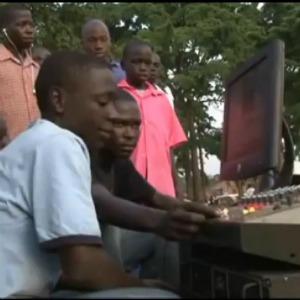BROOKE GLADSTONE: Musa Okwonga is a poet, musician and a blogger based in Britain who recently wrote about the Kony 2012 phenomenon in The Independent. He grew up hearing stories about Kony.
MUSA OKWONGA: My mother is from Gulu, which is a town that so many of the abductions, and my father, my late father who died when I was four, is from Kitgum District, which is just slightly further north of Gulu. So yes, they’re both very much from that region.
BROOKE GLADSTONE: Now, when this film was first being conceived that region was beset with catastrophe, but lately it’s undergone something of a renaissance. What was your reaction when you saw this place and Kony all over the place last week?
MUSA OKWONGA: Well, I was utterly bemused, to be honest. A Tweeter, I think her handle is @texasinafrica, commented that these days you can get cappuccino and pizza, you know, delivered to your house in Gulu. So it’s very different than it was when Kony first started his reign of terror. And when I came home and saw that “Stop Kony” was trending on Twitter, my first reaction was a sense, I think, of relief that this story had finally, you know, gone viral and it was getting the attention of the people, especially young people on Twitter.
But I also did think well, you know, why now? And I suppose that’s why I watched the film, and the film only left me with more questions, if I’m honest.
BROOKE GLADSTONE: What were the questions it raised for you?
MUSA OKWONGA: Well, Invisible Children said, you know, the film’s half an hour long, we can’t get everything in. But I think that a half hour viral video that gives a sense of completeness, that gives the appearance of completeness, and so not to mention really explicitly that Kony had left Uganda in 2006, not to mention the name of President Yoweri Museveni throughout the entire video, when Museveni himself would be integral to any solution, was a huge omission.
BROOKE GLADSTONE: He is the head of Uganda and wasn’t particularly aggressive in pursuing Kony when he had the chance.
MUSA OKWONGA: This is a man, President Museveni, who won power through military means in 1986-87 and then for the next 20-odd years was invaded by someone with far inferior forces to those that he’d ever faced before. So that to me was a real question mark. And the final problem, I think, which has been borne out by subsequent reaction in Northern Uganda to this video, is they didn’t seem to really engage Ugandan NGOs or Northern Ugandan victims of his atrocities in what they were doing because there’s just been shock and disbelief in Northern Uganda as a result of this video.
BROOKE GLADSTONE: Right. There were rotten vegetables thrown at the screen during a, a recent screening. Obviously, the point of this film is to raise awareness. There’s a general belief that unless you simplify things, then the awareness doesn’t really seep into the general consciousness.
MUSA OKWONGA: Nobody’s particularly served by oversimplifying a story to the point where the omissions themselves become dangerous. So I don’t think anybody has a problem with necessarily targeting Kony as a serious problem, but when you have quotes like, you know, Mr. Russell going on and saying that Joseph Kony is the world’s worst war criminal, I think it’s plain wrong because, actually, he’s abducted 30,000 people over the course of 26 years. Now, there are people who’ve killed far, far more than that.
I also think that in the half hour video, you can get plenty more in than just a somewhat binary narrative between good and evil.
BROOKE GLADSTONE: Would you assess the general impact of the film as doing more good than harm?
MUSA OKWONGA: I think so because fundamentally the world is a better place for more people knowing about what Joseph Kony has been doing for the last 26 years.
BROOKE GLADSTONE: Why? Does it change the reality on the ground?
MUSA OKWONGA: If we look at why it happened and how it happened, we can unpick these issues. So if we look at Uganda now, if we look at not only Joseph Kony and what he did for the people who enabled this reign of terror for 26 years, we can say, well maybe we shouldn’t be pumping military aid towards these people unquestioningly. Maybe we should be asking further questions about governance within Uganda.
BROOKE GLADSTONE: What do you think about the paternalism argument, that, you know, white teenagers need to come in on skateboards and set things right?
MUSA OKWONGA: I don’t like the “White Savior Complex” phrase, partly because it feels racist whenever it comes out of my mouth, if I’m honest. I think I do share some of the concerns about paternalism because this does look like a top-down solution. It does look like there has been little, very little consultation of people on the ground, NGOs, victims of the LRA, and so on.
And the reason that paternalism is really a problem, actually, is because it means that you’re building ill-fitting solutions for problems because you’re not consulting people directly affected by them. That’s where I have a real problem.
BROOKE GLADSTONE: Musa, thank you very much.
MUSA OKWONGA: The pleasure is mine. Thank you for having me.
[MUSIC UP AND UNDER]
BROOKE GLADSTONE: Musa Okwonga is a blogger for the British newspaper The Independent and other publications, and he’s also a vocalist with The King’s Will.
BOB GARFIELD: This is On the Media.
END SEGMENT A
